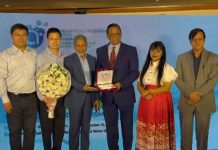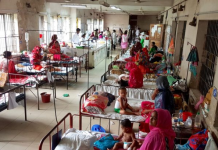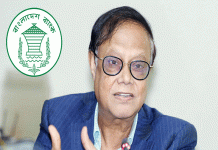
Mhafuza Islam
The Soil Resources Development Institute (SRDI) organized a high-profile seminar titled “Insights into Soil Salinity Mapping 2024 in Bangladesh” at the Multipurpose Hall of its Head Office, Dhaka, emphasizing the critical role of saline soil and water management in promoting sustainable agriculture, food security, and safe food production.
The seminar, held on Thursday, November 6, 2025, brought together leading policymakers, scientists, researchers, educators, and students to discuss the latest developments in soil salinity mapping and its significance for agricultural planning and productivity.
The event was graced by Mr. Md. Selim Khan, Honorable Additional Secretary of the Ministry of Agriculture, as the chief guest. Special guests included Dr. Md. Abdus Salam, Executive Chairman of the Bangladesh Agricultural Research Council, and Mr. Md. Rezaul Amin, Executive Director of the Cotton Development Board.
In her opening remarks, Dr. Begum Samia Sultana, Director General of SRDI, highlighted the institute’s commitment to updating national soil salinity data to support sustainable agricultural practices. She noted that accurate soil and water salinity information is vital for policy formulation, agricultural planning, and enhancing crop yields while maintaining soil health.
The seminar featured a comprehensive presentation by Mr. Amir Md. Zahid, Chief Scientific Officer of SRDI, who outlined the key findings and methodologies behind the upcoming Saline Soils of Bangladesh – 2025 report. This new publication aims to update the 2009 report and provide refined, science-based maps reflecting current soil salinity conditions across coastal and inland regions.
A diverse group of participants, including former and current SRDI scientists, university faculty, students, and researchers from affiliated institutions, actively engaged in discussions. Attendees provided insightful, evidence-based recommendations to enhance the accuracy of the data and maps, ensuring that the updated publication meets the practical needs of planners, policymakers, and agricultural stakeholders.
The seminar concluded with a consensus on the importance of regular monitoring of soil salinity and the integration of updated data into national agricultural planning. Participants emphasized that such initiatives are crucial for safeguarding soil health, optimizing crop production, and supporting the country’s long-term food security objectives.
About SRDI: The Soil Resources Development Institute is the leading government body responsible for soil resource assessment, monitoring, and management in Bangladesh. Its research and publications play a pivotal role in guiding sustainable agricultural practices across the country.






